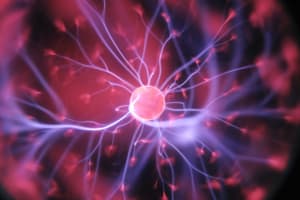Maybe you’ve woken up in the middle of the night with a sudden solution to a problem that’s been plaguing you for a while. Maybe you’ve also regretted staying up all night when your sluggish brain can’t quite seem to come up with new ideas the next afternoon.
There are lots of claims about the links between sleep and the creative thinker. Some point to the insomniac artist, or the late-to-bed, early-to-rise silicon valley executive as proof that creative modes of thinking don’t require much sleep. Others say that a full night of restful sleep is key in restoring brainpower, and helpful in giving us our best chances to think outside the box and to problem solve.
But what is the real connection between the two? Is more sleep better for creativity, or worse? Is there a way to change our sleep habits to make us more creative?

What the Science Says
Scientists studying the links between sleep and creativity certainly have more questions than answers. Their research has yielded mixed and often conflicting results about the exact ways that sleep increases or hinders imaginative thinking. However, there are a few generally accepted theories about how sleep and creativity interact. Many of them suggest that there is a definite link between the two, even if the specifics of that relationship are yet to be pinned down.
Sleep does seem to promote creative problem-solving in most cases
Many in the scientific community agree that there is a correlation between getting a solid night’s sleep, and an individual’s ability to think creatively to solve problems. Though creativity is a broad term which refers to a wide range of thought patterns, sleeping has been shown to increase cognitive flexibility (the ability to switch between thinking about one concept or another), the ability to discover remote associations (connections between seemingly unrelated things), and boost creative insights.
One 2004 study even found that well-rested subjects were twice as likely as their less-rested peers to discover patterns or hidden rules in abstract puzzles that experimenters presented them with.
There are many theories about why this is the case. From the simplest perspective, maintaining healthy sleep patterns leads our brain and body to function at their highest levels. It follows that thinking creatively, which is a higher brain function, should be easier when we are well-rested. Memory, mood, and general cognitive ability also increase with a good night’s sleep. This, in turn, can help us be more creative.
However, there is also exciting evidence that links our creativity to the specific neurological functions our brains undergo when we slumber.
 Different stages of sleep affect our creative mind differently
Different stages of sleep affect our creative mind differently
Sleeping revolves around what is known as the “sleep cycle.” This cycle is a repeating series of brain states we move through as we sleep. Different parts of this cycle correspond to different brain waves, some of which appear to be more directly related to enhancing our creativity than others.
For example, researchers at UC San Diego and UC Los Angeles found that REM (rapid eye movement) sleep is directly related to creative problem-solving. During REM, the brain is at its most active, working to solidify and connect information and ideas planted in the brain during waking hours. REM sleep is also when people usually experience their most vivid dreams and creative ideas. A possible consequence of the increased synaptic firing that marks the brain’s mission to make sense of the day’s activity. The researchers found that subjects who were given periods of REM sleep were able to come up with more creative solutions to problems than others who simply rested quietly or engaged in non-REM sleep. They hypothesized that this was due to REM sleep’s role in “enhancing integration of unassociated information.”
In other words, REM sleep helps us move newly gathered information into our brains in such a way that we can more easily make associations between it and what we already know.
This discovery could also help us better understand why dreams feel like such creative expressions of our most pressing thoughts.
“Creative Insomnia” is a puzzling exception to the rule
Interestingly, it seems the mythos of the insomniac artist may be rooted in reality. Despite the extensive scientific literature proving links between healthy sleep patterns and better creative abilities, scientists are beginning to suspect that highly creative people might struggle with insomnia more than the average person.
One study on this found that between a group of highly creative children and a group of regular children, there was a significantly higher incidence of disruptive sleep patterns among the creative children that the others.
Though more research must be done, the researched hypothesized that it might be the creative process itself that results in disrupted sleep.

How Can I Use Sleep to Make Myself More Creative?
If you want to use sleep to make yourself more creative, we suggest a few important tips:
1. Make sure you get a good night’s sleep: This could be the most important part of thinking creatively—when you sleep well, your brain works better, simple as that. Do everything you can to ensure you have proper sleep hygiene, including limiting screen time before bed, eating well and exercising frequently.
2. Trigger your creative thinking while sleeping: Researchers found that when people were exposed to a smell while working on a creative problem, and later exposed to that same smell when sleeping, they were more likely to find creative solutions. This may feel a bit like superstition, but maybe using an aroma diffuser while writing your novel and sleeping could yield results.
3. Take your dreams seriously: Despite all of the famous examples throughout the time of dreams leading to creative achievements, we now know scientifically that the link between dreams and creativity may have to do with the REM brain activity. Keep a dream journal, and make note of how your seemingly abstract dreams might be coded solutions to problems in your life.
4. Take naps: When you take a nap, especially if you are sleep deprived, you might enter REM sleep more quickly. This can be harnessed to stimulate creative thinking or help make sense of a tough problem in an abstract way.
5. Keep the problems you want to solve in your head while you drift off: You are likely to revisit pressing information during sleep if you are thinking about it when you fall asleep. This explains dreams about your stressful day, but also how you can wake up with magical solutions to problems you can’t get out of your head. It’s tricky though, because lying in bed thinking about your stressors can keep you from falling asleep.